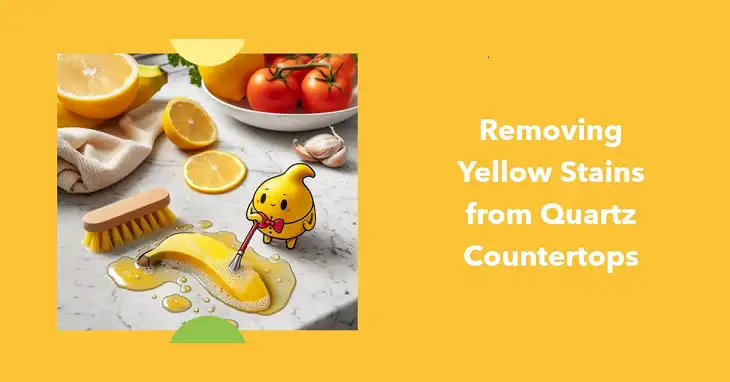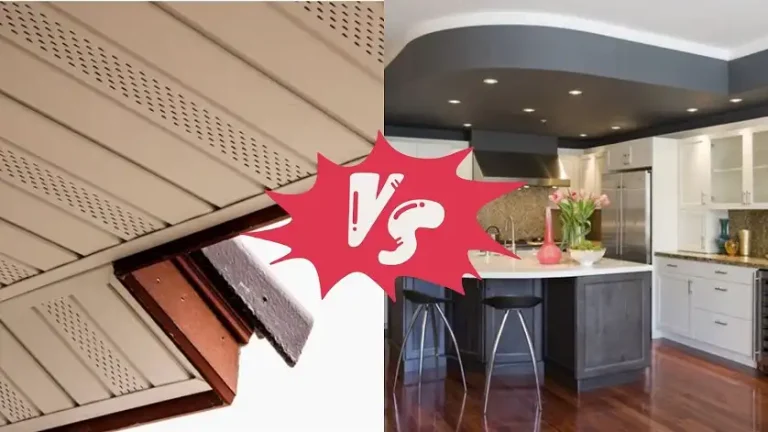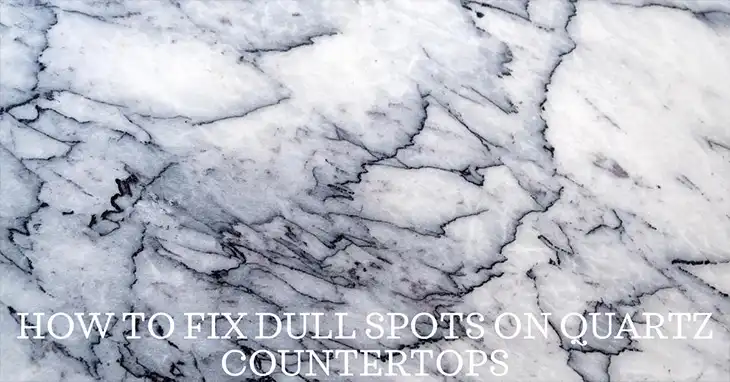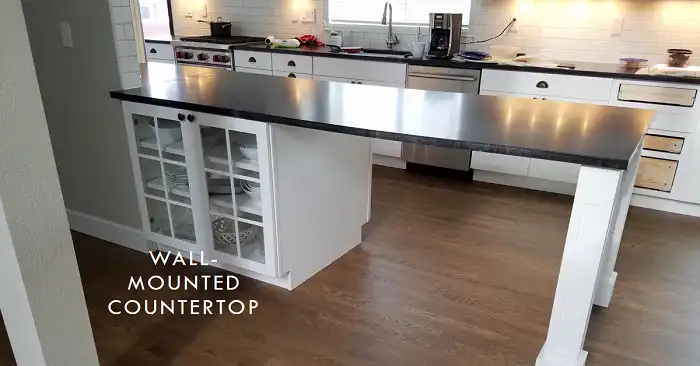How to Remove Yellow Stains from Quartz Countertops
Quartz countertops are renowned for their durability, aesthetic appeal, and low maintenance requirements. However, even these hardy surfaces can develop unsightly yellow stains over time. Spills, mineral deposits, and sun damage are common culprits behind yellow discoloration. Fortunately, with the proper techniques, you can restore the pristine beauty of your quartz.
This article will start with what causes those pesky yellow stains on quarts countertops and then we’ll discuss how you can deal with it.

What Causes Yellow Staining on Quartz?
Before tackling yellow stains, it helps to understand what causes them in the first place. This gives insight into the best removal methods.

Food and Beverage Spills
Spilling pigmented foods and liquids is one of the most common ways yellow stains occur on quartz. Substances like coffee, wine, oil, turmeric, and strongly colored fruit juices can seep into tiny crevices in the material. Given quartz’s nonporous nature, these spills stay on the surface rather than soaking in deeply.
Prolonged Sun Exposure
Quartz contains natural pigments that give it its vibrant coloration. Over many years, the UV rays in sunlight can actually break down these pigments. This causes the material to slowly yellow. Lighter quartz colors tend to show such sun damage more noticeably.
Hard Water Mineral Deposits
Minerals in hard water, like calcium and magnesium, leave behind stubborn residue when the water evaporates. This builds up over time into yellow stains. You may notice these water spots clustered around sinks and faucets.
How to Clean Yellow Stains from Quartz Countertops
Tackling stains promptly with the appropriate cleaner prevents discoloration from becoming ingrained. Here are effective techniques ranging from mild to heavy-duty.

Dish Soap and Warm Water for Light Stains
For a surface-level stain that hasn’t had time to set in, a mild detergent mixed with warm water often does the trick. Apply a small amount of diluted dish soap directly on the stain. Let it sit for a minute before scrubbing it gently with a soft microfiber cloth. The warm water helps dissolve the staining substance while the soap lifts it.
Be sure to rinse the area thoroughly afterward to eliminate soap residue. Avoid abrasive scouring pads or paper towels, which could scratch quartz.
Baking Soda and Water Paste for Moderate Stains
For more stubborn yellow spots and built-up grime, make a paste of baking soda and water. The baking soda offers a gentle abrasive effect to lift stains without damaging the quartz. Mix a tablespoon of baking soda with just enough water to form a spreadable paste.
Rub the paste onto the stained area using a damp microfiber cloth. Let it sit for 15-20 minutes before scrubbing again. Rinse thoroughly with clean water to remove all of the baking soda paste. This technique can tackle stains from coffee, wine, oil residues, and superficial mineral deposits.
Vinegar and Water Solution for Tougher Stains
Vinegar’s acidic nature helps dissolve and lift stains. Mix equal parts white vinegar and water in a spray bottle. Spritz the solution directly onto any yellow-stained areas of the quartz. Allow 5-10 minutes of dwell time before scrubbing with a soft cloth and rinsing well.
The vinegar neutralizes mineral deposits while helping break down deeply set-in staining. Take care not to leave straight vinegar sitting on the quartz, which could etch the material over time.
Hydrogen Peroxide for Heavy Stains
For stubborn yellow stains that don’t respond to vinegar, break out the hydrogen peroxide. The bubbling reaction helps lift discoloration. Pour undiluted 3% hydrogen peroxide directly on the stained quartz area. Allow it to sit for 2-3 minutes before wiping it away with a damp microfiber cloth. Reapply if needed for tough stains.
Hydrogen peroxide works well on organic stains from food, beverages, and aging sealant residue. Rinse thoroughly afterward since extended exposure can damage quartz.
Quartz Cleaners for Deep Stains
For cleaning quartz, you can purchase specialty stone cleaners formulated to remove stubborn stains without harming the material. Look for non-acidic cleaners specifically made for quartz. Carefully follow the manufacturer’s dilution instructions before applying it to stained areas.
Many quartz cleaners contain hydrogen peroxide for stain removal. Let the cleaner sit for 5-10 minutes before wiping away residue and rinsing. Only use these cleaners occasionally, not for regular maintenance.
How to Remove Severe Yellow Stains from Quartz Countertops
For severe yellow staining or stains that have set in over time, try these heavy-duty techniques. They require more time and effort but can restore badly discolored quartz.

The Poultice Method
Creating a stain-fighting paste called a poultice can draw out deep stains. Mix a tablespoon of baking soda or powdered quartz cleaner with just enough water to form a spreadable paste. Using a plastic spatula, apply a 1/4-inch thick layer directly on the stain.
Cover the paste with plastic wrap to prevent it from drying out. Leave the poultice on for 24 hours before removing the plastic. Gently scrub away the paste with a soft, damp cloth. Rinse thoroughly with clean water. Repeat if needed for stubborn stains. The poultice paste slowly draws out the discoloration.
Steam Cleaning
For broad yellow staining across a large surface area, a handheld steam cleaner can be effective. The heat helps loosen ingrained dirt and stains to make scrubbing easier. Work in small sections, holding the steam cleaner nozzle 6-8 inches above the quartz. Pass it slowly over the stained surface for 30 seconds before wiping it with microfiber cloths.
The combination of heat and moisture breaks down staining residues. Just take care not to allow the steamer to linger too long in one spot, as intense heat can damage quartz. Rinse and scrub each section after steaming to remove lifted stains.
How to Prevent Quartz Countertops from Staining
While no surface is immune to stains, quartz is highly resilient when properly cared for. Follow these tips to minimize the chances of yellow discoloration occurring in the first place.
- Clean up spills immediately before they have a chance to set in. Blot liquids promptly with an absorbent cloth.
- Always use coasters under glasses, mugs, and bottles. This prevents damaging moisture rings.
- Put down protective placemats when setting out food or dining on the quartz.
- For hot pans or baking dishes straight from the oven, set them on trivets rather than directly on the quartz.
- Avoid leaving strongly pigmented liquids like wine or fruit juice sitting on the surface.
- Wipe up cooking oils and food residues after meal prep to prevent buildup.
- Don’t let soaps, cosmetics, or cleaning products sit on the quartz. Rinse residues away.
- Use cutting boards for food prep rather than slicing directly on the countertop.
- Apply a penetrating quartz sealer annually to shield from spills and stains.
- Clean quartz weekly with mild soap and water to prevent grime accumulation.
Frequently Asked Questions
What are the most common causes of yellow stains on quartz countertops?
Food and beverage spills, mineral deposits from hard water, prolonged sun exposure, cleaning product residues, and general grime buildup over time. Staining tends to become more noticeable on lighter quartz colors.
Can I use lemon juice or vinegar without diluting to remove stains?
It’s not recommended, as the high acid content in undiluted lemon juice or vinegar could etch or damage the quartz surface over time. Always dilute with equal parts water first.
I have stubborn oil stains left from food prep. What’s the best way to tackle them?
Make a poultice paste with baking soda or powdered quartz cleaner to draw out oil stains. Apply the paste directly on the stain, cover it with plastic wrap, and allow it to sit overnight before rinsing off.
No matter what I try, I can’t get these yellow stains out. Do I need to replace my countertop?
Not necessarily. For severe staining issues, talk to a professional stone restoration company. They have industrial cleaning solutions and tools that may be able to successfully remove stains without needing to replace the quartz.
Final Thoughts
Quartz offers unparalleled durability for busy kitchens and bathrooms. However, like any surface, it can suffer from unsightly staining over time. With this comprehensive guide, you now have a wide arsenal of techniques to tackle yellow discoloration.
Arm yourself with the right tools and solutions tailored to your stain situation. With some elbow grease and patience, you can erase frustrating stains and maintain your quartz countertops in pristine condition for years of enjoyment.






